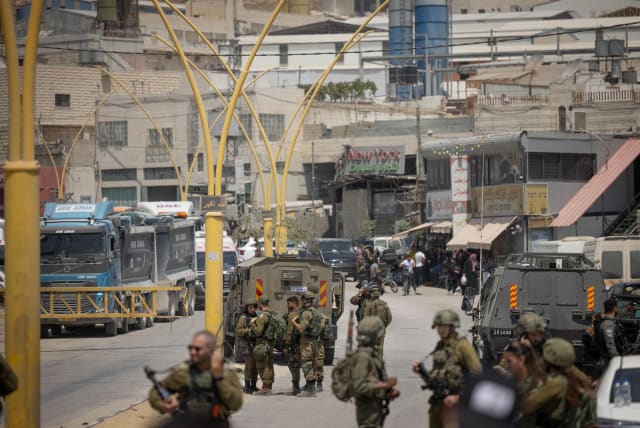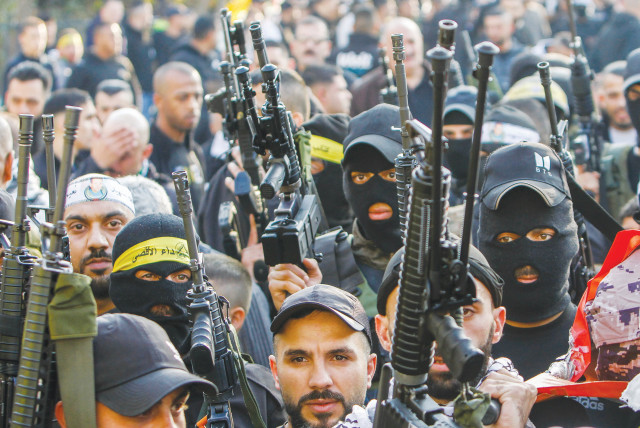How is Iran influencing Palestinian terrorism in the West Bank? - analysis

The attempt by Iran to increase attacks, weapons smuggling and incidents in the West Bank is an emerging threat for Israel.
Shooting attacks in the West Bank increasingly have Iran’s influence and hand behind them.
Defense Minister Yoav Gallant acknowledged this emerging threat yesterday when he said that “it is important to understand the significant change that is taking place on the ground – it is related to Iranian funding, and to the proliferation of weapons under the Iranian directive. Iran seeks every means to harm the citizens of Israel.”
Iran has backed Palestinian terror groups, such as Hamas and Palestinian Islamic Jihad, for many years. However, the attempt by Iran to increase attacks, weapons smuggling, and terror incidents in the West Bank is an emerging threat and it is one that has fueled an uptick in violence over the last year.
A flood of weapons into the West Bank
In July, Hamas boasted about possessing new explosive devices, similar to the EFPs used by Iranian-backed groups in Lebanon and Iraq. Iranian media has often heralded these developments, asserting that Iran is increasing its threats to Israel on multiple fronts and in multiple arenas.
The rise in attacks in places like Jenin, and the recent attack near Hebron, are fueled by a flood of weapons into the West Bank. Since last November we have documented this flood of weapons through social media accounts and other media that showcase the kinds of rifles and firearms used by Palestinian perpetrators. Last year, when we began documenting this at The Jerusalem Post, we illustrated how many of the M-4 and M-16 style rifles possessed by terrorists had accessories, such as additions to their rails including sights and other grips, that represent recent acquisitions. This suggests that rat lines and smuggling operations are supplying the terror groups. In addition, there have been numerous interceptions of weapon smuggling attempts and hundreds of weapons found, some of which are recently made firearms.
Iranian pro-regime media linked to the IRGC, such as Fars News and Tasnim News, have often boasted of Iran’s role in these attacks. For instance, after the Hebron attack, Iran’s Fars News noted that Israel blamed Iran for the wave of attacks. “The Palestinian resistance forces targeted several Zionist settlements in Hebron in the south of occupied Palestine in an operation earlier this afternoon. Following this operation, one Zionist was killed and five others were injured,” the report at Fars claimed.
IRGC Quds Force focused on fueling West Bank attacks
The IRGC high command has also boasted of its role in fueling attacks in the West Bank.
The IRGC Quds Force head, Ismail Qaani, recently pointed to increased attacks on Israel. He didn’t say whether these were carried out by Iran’s proxy, Palestinian Islamic Jihad, in the reports, but he did openly discuss the attacks. “Recently, 15 to 30 attacks are carried out daily in the West Bank by the resistance forces against the Zionist regime,” Qaani said, according to Tasnim news. This matters because Iran is closely watching recent developments in the West Bank, including the fatal attacks in Huwara on Saturday and near Hebron on Monday, in which three people were murdered.
In July, the pro-Iran website Al-Mayadeen celebrated the alleged rocket threat that is emerging in the northern West Bank against Israel. According to their report the Al-Ayyash terrorist group, which it says is part of Hamas’s Al-Qassam brigades, threatened Israel with a “Qassam 1 rocket.” Images and video evidence were posted online by Hamas-linked media.
The report claimed that the rocket was used on Tisha Be’av due to Israelis ascending the Temple Mount.
Jerusalem Post Store
`; document.getElementById("linkPremium").innerHTML = cont; var divWithLink = document.getElementById("premium-link"); if (divWithLink !== null && divWithLink !== 'undefined') { divWithLink.style.border = "solid 1px #cb0f3e"; divWithLink.style.textAlign = "center"; divWithLink.style.marginBottom = "15px"; divWithLink.style.marginTop = "15px"; divWithLink.style.width = "100%"; divWithLink.style.backgroundColor = "#122952"; divWithLink.style.color = "#ffffff"; divWithLink.style.lineHeight = "1.5"; } } (function (v, i) { });

